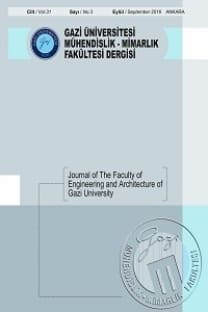Öğrenme etkili akış tipi çizelgelemede ortalama akış zamanının enküçüklenmesi
Minimizing mean flow time in a flowshop scheduling with learning effect
___
- 1.Nadler, Ö., and Smith, W. D., "Manufacturing Progress Functions for Types of Processes", International Journal of Production Research, Volume 2, pp. 115-135,1963.
- 2.Yelle, L. E., "The Learning Curve: Historical Review and Comprehensive Survey", Decision Science, Volume 10, pp. 302-328,1979.
- 3.Biskup, D., "Single-Machine Scheduling with Learning Considerations", European Journal of Operational Research, Volume 115,pp.173-178,1999.
- 4.Cheng, T. C. E., and Wang, G., "Single Machine Scheduling with Learning Effect Considerations", Annals of Operations Research, Volume 98, pp. 273-290, 2000
- 5.Mosheiov, G., "Scheduling Problems with Learning Effect", European Journal of Operational Research, Volume 132, pp. 687-693, 2001a.
- 6.Mosheiov, G., "Parallel Machine Scheduling with Learning Effect", Journal of The Operational Research Society, Volume 52, pp. 1165-1169,2001
- 7.Eren, T., ve Güner, E., "İşe-Bağımlı Öğrenme Etkili Çizelgeleme Problemlerinin Çözümü için Bir Matematiksel Model", Z.K.Ü. Karabük Teknik Eğitim Fakültesi Teknoloji Dergisi, Yıl 5, Sayı: 3-4, s. 121-127, 2002.
- 8.Mosheiov, G., and Sidney, J. B., "Scheduling with General Job-Dependent Learning Curves", European Journal of Operational Research, Volume 147, pp. 665-670, 2003.
- 9.Wright, T. P., "Factors Affecting The Cost of Airplanes", Journal of The Aeronautical Sciences, Volume 3, pp. 122-128,1936.
- 10.Heizer, J., and Render, B., Operations Management, (6. ed.), Prentice Hall, New Jersey, ABD, 2001.
- 11.Garey, M. R., Johnson, D. S., and Sethi, R., "The Complexity of Flowshop and Jobshop Scheduling", Mathematics of Operations Research, Volume 1, No: 2, pp. 117-129,1976.
- 12.Chen, C.-L., and Bulfin, R. L., "Complexity of Single Machine Multi-criteria Scheduling Problems", European Journal of Operational Research, Volume 70, pp. 115-125,1993.
- 13.Chou F.-D., and Lee, C.-E., "Two-machine Flowshop Scheduling with Bicriteria Problem", Computers & Industrial Engineering, Volume 36, pp. 549-564,1999.
- 14.Lindo Systems, Inc, Hyper LINDO/PC Release 6.01, Chicago, USA, 1997.
- ISSN: 1300-1884
- Yayın Aralığı: Yılda 4 Sayı
- Başlangıç: 1986
- Yayıncı: Oğuzhan YILMAZ
Mobilya imalatında faaliyet maliyetleri yardımıyla simülasyon destekli personel organizasyonu
Ercan TANRITANIR, H. İbrahim KORUCA, Hasan ALKAN, Abdullah SÜTÇÜ
Adnan SAĞLAM, Ramazan SELVER, Nuri ÖZEK
Bulanık mantık denetimli seri aktif güç filtresi kullanarak harmonik gerilimlerin bastırılması
Üretim kaynakları planlama sisteminde ana üretim çizelgesinin dondurulması
GENETİK ALGORİTMA YÖNTEMİ İLE SU ŞEBEKELERİNDE HİDROLİK KALİBRASYONUN GELİŞTİRİLMESİ
Sarper GÖZÜTOK, Osman N. ÖZDEMİR
SÜRTÜNME KARIŞTIRMA KAYNAĞINDA KAYNAK HIZININ BİRLEŞEBİLİRLİĞE ETKİSİ
Adem KURT, Mustafa BOZ, Mehmet ÖZDEMİR
KARAYOLU ESNEK ÜSTYAPI TASARIMINDA YENİ BİR YÖNTEM: YÜKSEK PERFORMANSLI ASFALT KAPLAMA
Tabakalı akışkan ortamındaki su alma ağzına ait kritik batıklık
